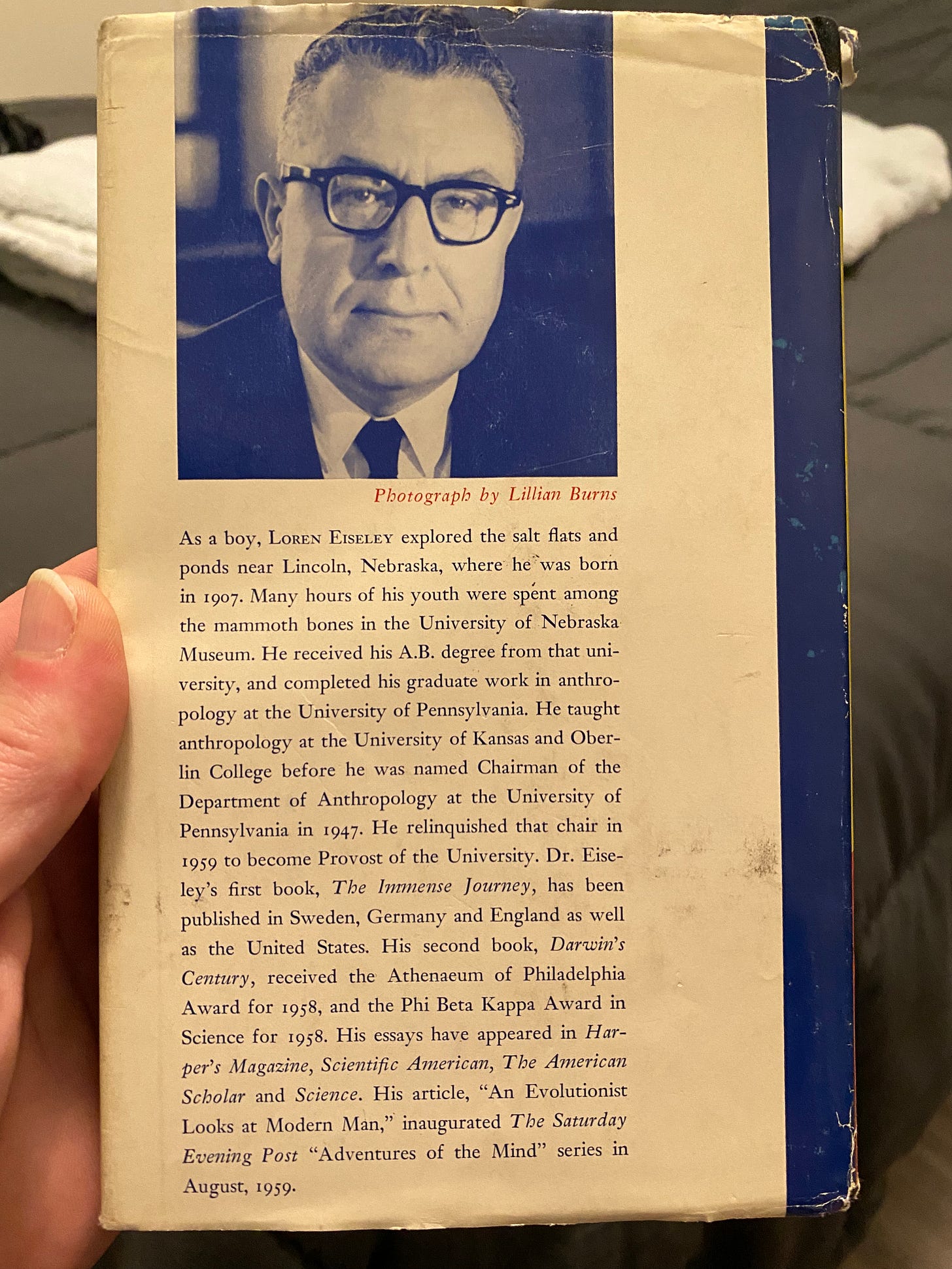Halfway through reading Loren Eiseley’s The Firmament of Time I was asked what it was about. I tried to say something one could grasp onto that might make sense, then realized the book is about the inability to answer this very question in any satisfactory way.
An anthropologist, Eiseley spent the better part of this book attempting to dissect the nature of time, evolution, perception, meaning, experience, dream. Originally a series of lectures delivered at the University of Cincinnati in 1959, the text here isn’t academic or scholarly but poetic, romantic, hungry. With glorious prose he marries the wonder of subjective experience with the majesty of the universe:
We know that sunlight fell, as it falls now, upon this planet. We know that rain fell, as it falls now, upon wet beaches that have never known the step of man. We can read the scampering imprints of the raindrops upon the wet mud that has long since turned to stone. We can view the ripple marks in the sands of vanished coves. In all that time the ways of the inanimate world have not altered; storms and wind, sun and frost, have worked slowly upon the landscape. Mountains have risen and worn down, coast lines have altered. All that world has been the product of blind force and counterforce, the grinding of ice over stone, the pounding of pebbles in the mountain torrents - a workshop of a thousand hammers and shooting sparks in which no conscious hand was ever visible, today or yesterday.
Moving back and forth with ease from the scientific need for logic, measurement and precision, to the flickering corners of fear and uncertainty, Eiseley seems to travel across time in full-fledged fever dream:
I moved in silence now, waiting a sign. I saw it finally, a green lizard on a stone. We were far back, far back. He bobbed his head uncertainly at me, and I reined in with the nostalgic intent, for a moment, to call him father, but I saw soon enough that I was a ghost who troubled him and that he would wish me, though he had not the voice to speak, to ride on.
He goes on…
An enormous emptiness by degrees possessed me. I was back almost, in a different way, to the thin air over the mountain, to the end of all things in the cold starlight of space.
I passed some indefinable bones and shells in the salt-crusted wall of a dry arroyo. As I reined up, only sand dunes rose like waves before me and if life was there it was no longer visible. It was like coming down to the end – to the place of fires where we began. I turned about then and let my gaze go up, tier after tier, height after height, from crawling desert bush to towering pine on the great slopes far above me.
If the first half of the book describes an evolution of prevailing thought about the nature of the world and how those who challenged the fashionable narratives of their time helped to chart a new course in our conceptions of the present world and its history, the second half ties this all together with direct and indirect allusions to the role of subjective experience. It is unlike any other scientific writing you’re likely to encounter.
I’ll leave you with something more grounded that summarizes not just this book but the mind of the man who strung together such slippery subjects with the measure of a master craftsman whose aim was not to propagate or prove but, like a good scientist, to rigorously challenge:
I am a man who has spent a great deal of his life on his knees, though not in prayer. I do not say this last pridefully, but with the feeling that the posture, if not the thought behind it, may have had some final salutary effect. I am a naturalist and a fossil hunter, and I have crawled most of the way through life. I have crawled downward into holes without a bottom, and upward, wedged into crevices where the wind and the birds scream at you until the sound of a falling pebble is enough to make the sick heart lurch. In man, I know now, there is no such thing as wisdom. I have learned this with my face against the ground. It is a very difficult thing for a man to grasp today, because of his power; yet in his brain there is really only a sort of universal marsh, spotted at intervals by quaking green islands representing the elusive stability of modern science - islands frequently gone as soon as glimpsed.





